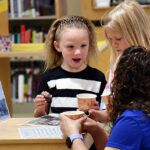Home »

Busy Bag workshop to help children unplug
 Parents with children up to the age of six are invited to Project Playtime, a screen smart initiative happening in the East Kootenay. Parents can register for a free Busy Bag Make and Take workshop where they will make two busy bags for their preschool aged children to use as an alternative to screen time.
Parents with children up to the age of six are invited to Project Playtime, a screen smart initiative happening in the East Kootenay. Parents can register for a free Busy Bag Make and Take workshop where they will make two busy bags for their preschool aged children to use as an alternative to screen time.
Offered in partnership by the Cranbrook Early Years table, Children First, and Success by 6, the event will also provide an opportunity to learn about the effects of screen use on young children.
BUSY BAG MAKE & TAKE WORKSHOP (free for families of children aged 0-6 years old. ) November 21 at 11 a.m. at Bellies to Babies Cranbrook Family Connections Building, 209A-16th Ave N – Childcare provided. Call to register 250-919-2747 or email [email protected]
And also on November 24 at 11 a.m. Aboriginal Early Years Program Cranbrook Family Connections Building, Chief Joseph Centre 1007 Baker St. Childcare provided. Call Chelsea 250-489-4563 to register.
Research clearly indicates children are spending too much time engaging with screens (i.e. TV, computer, DVD, ipads) and not enough time interacting with family, friends and caregivers.
Some studies suggest:
• On any given day, 29% of babies under the age of one are watching TV and videos for an average of about 90 minutes. 23% have a television in their bedroom.
• Time with screens increases rapidly in the early years. Between their first and second birthday, on any given day, 64% of babies and toddlers are watching TV and videos, averaging slightly over two hours. Thirty-six percent have a television in their bedroom.
• Data varies on the amount of time preschool children spend with screen media, but even the most conservative findings show that children between the ages of two and five average 2.2 hours per day. Other studies show that preschoolers spend as much as 4.1 and 4.6 hours per day using screen media.
 Dr. Michael Rich is an associate professor of pediatrics at Harvard Medical School, specializing in medicine and media. His “three major concerns with digital technology, or screen time, are how we sacrifice our ¬personal interactions with others in favour of an online existence, how our children are losing time for creative play, and losing their ability to manipulate the physical environment. Young children who spend excessive time looking at screens will likely be “impoverished” in the above three areas and—given the rapid brain development in the first three years—are in fact “pruning away circuitry they may need in the future.”
Dr. Michael Rich is an associate professor of pediatrics at Harvard Medical School, specializing in medicine and media. His “three major concerns with digital technology, or screen time, are how we sacrifice our ¬personal interactions with others in favour of an online existence, how our children are losing time for creative play, and losing their ability to manipulate the physical environment. Young children who spend excessive time looking at screens will likely be “impoverished” in the above three areas and—given the rapid brain development in the first three years—are in fact “pruning away circuitry they may need in the future.”
The Cranbrook Early Years’ team is trying to help parents with activities and strategies that will reduce screen time and increase together time. Natalie Rudrum, Cranbrook Early Years Coordinator, suggests “we all want to find the right balance as we raise our children in this digital age, and juggle work and family responsibilities. We want to encourage parents to become aware of not only how much screen time is appropriate for themselves and their young children but also how to use screen time with them. We have some great resources we can share with parents to help them learn to limit their children’s screen time and how to manage their own screen behaviour that they are modelling for their children.”
The Cranbrook Early Years Committee provides a forum where individuals and interested groups work together to address the importance of the first six years of a child’s life. Our committee is dedicated to working with local and regional governments and other interested parties to help ensure that Cranbrook children birth to six years of age develop the emotional, social, cognitive, and physical skills they need before they enter school.
Through these partnerships we build and enhance community services in Cranbrook, through engaging citizens in early childhood development and funding programs that strengthen young children and their families. We envision a community where all children are valued, respected, nurtured, loved and given the opportunity to develop their full potential.
The table membership represents a variety of sectors including children’s service providers, community school coordinators, aboriginal services, government agencies, families, library services and interested community members.
The committee is funded by Children First and Success by Six. The Children First Initiative strives to build the capacity of communities to support the healthy growth and development of young children and their families through a comprehensive and integrated service delivery system. Success by Six is a community-based, cross-sectoral partnership of people and organizations that share a common vision-children ready to succeed when they enter school.
Children First/Success by Six







